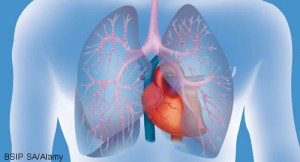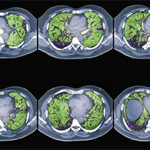 If Aryeh Fischer, MD, could tell rheumatologists one thing about interstitial lung disease (ILD), it would be to listen to their patients’ lungs.
If Aryeh Fischer, MD, could tell rheumatologists one thing about interstitial lung disease (ILD), it would be to listen to their patients’ lungs.
“What we hear from the pulmonologists is, ‘Why don’t we see these patients earlier?’” says Dr. Fischer, associate professor of medicine, Division of Rheumatology, Division of Pulmonary Sciences and Critical Care Medicine, at University of Colorado School of Medicine in Denver. “A real call to action as rheumatologists is to be more aware of interstitial lung disease and to try to diagnose it earlier. Let’s ask about shortness of breath, listen to our patients’ lungs [and] order chest imaging. And let’s try to get these patients diagnosed earlier because early detection should lead to better outcomes.
Recently, Dr. Fischer talked with The Rheumatologist about ILD:
Q: How common is ILD?
A: It’s quite common in systemic autoimmune patients, but it really depends on which type of disease we’re discussing. For systemic sclerosis, upward of 80 or 90% of patients may have a component of interstitial lung disease. It may only come to clinical relevance in somewhere around 30% [of cases]. But it’s the leading cause of death in systemic sclerosis. It’s quite prevalent in muscle inflammatory diseases …, and there’s a growing appreciation that it’s common in rheumatoid arthritis, as well.
Q: Why do you say a ‘growing appreciation’?
A: People are looking for it more. Technology has advanced, and we have better imaging modalities than ever before. So the high-resolution CT scan really has allowed us to get a better appreciation for types of lung disease, patterns and, perhaps, more in the way of prevalence. … It’s a combination of both seeking it out and having the technology to go look for it.
Q: Should all rheumatologists keep ILD in front of mind?
A: The reality for rheumatology is [that] there’s a lot we’ve got to keep track of. There’s already an appreciation that heart disease is a real threat and our [patient] population is at a higher risk. Similarly, we know that our patients—particularly those with systemic autoimmune conditions are at risk for lung involvement. … We should be listening to their lungs and asking them about lung disease. … It’s a game changer, because [ILD] can be life threatening.
Richard Quinn is a freelance writer in New Jersey.



